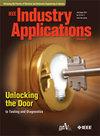Decentralized Stochastic Optimal Power Flow Problem Considering Prohibited Operating Zones and Renewables Sources
IF 4.2
2区 工程技术
Q2 ENGINEERING, ELECTRICAL & ELECTRONIC
引用次数: 0
Abstract
The traditional Optimal Power Flow (OPF) problem is formulated in a centralized manner assuming a single operator manager has full access to the system information. However, transmission power systems often consist of interconnected areas controlled by multiple regional operators who can only access local information and must coordinate with neighboring areas, sharing limited data like voltage magnitude and angle at tie-lines. In this work, the decentralized OPF problem is extended by including prohibited operational zones (POZ) constraints of thermoelectrical units and formulated as a mixed-integer nonlinear programming model. Uncertainties in load behavior and renewable energy sources are addressed using a stochastic scenario-based approach. A matheuristic algorithm based on the variable neighborhood descent heuristic method is used to handle the integer variables. The proposed model and solution technique are applied in the IEEE 118-bus system, considering the local weather conditions. The obtained results demonstrate the good quality and performance of the proposed model and solution technique compared with the solution of the OPF problem considering a centralized approach.考虑禁作区和可再生能源的分散随机最优潮流问题
传统的最优功率流 (OPF) 问题是以集中方式提出的,假设单个运营商经理可以完全访问系统信息。然而,输电系统通常由多个区域运营商控制的互联区域组成,这些运营商只能访问本地信息,而且必须与邻近区域协调,共享有限的数据,如连接线上的电压大小和角度。在这项工作中,分散式 OPF 问题通过加入热电机组的禁止运行区(POZ)约束进行了扩展,并被表述为一个混合整数非线性编程模型。采用基于随机情景的方法解决了负荷行为和可再生能源的不确定性问题。在处理整数变量时,采用了基于变量邻域下降启发式方法的数学启发式算法。考虑到当地的天气条件,在 IEEE 118-bus 系统中应用了所提出的模型和求解技术。结果表明,与采用集中式方法解决 OPF 问题相比,所提出的模型和求解技术具有良好的质量和性能。
本文章由计算机程序翻译,如有差异,请以英文原文为准。
求助全文
约1分钟内获得全文
求助全文
来源期刊

IEEE Transactions on Industry Applications
工程技术-工程:电子与电气
CiteScore
9.90
自引率
9.10%
发文量
747
审稿时长
3.3 months
期刊介绍:
The scope of the IEEE Transactions on Industry Applications includes all scope items of the IEEE Industry Applications Society, that is, the advancement of the theory and practice of electrical and electronic engineering in the development, design, manufacture, and application of electrical systems, apparatus, devices, and controls to the processes and equipment of industry and commerce; the promotion of safe, reliable, and economic installations; industry leadership in energy conservation and environmental, health, and safety issues; the creation of voluntary engineering standards and recommended practices; and the professional development of its membership.
 求助内容:
求助内容: 应助结果提醒方式:
应助结果提醒方式:


